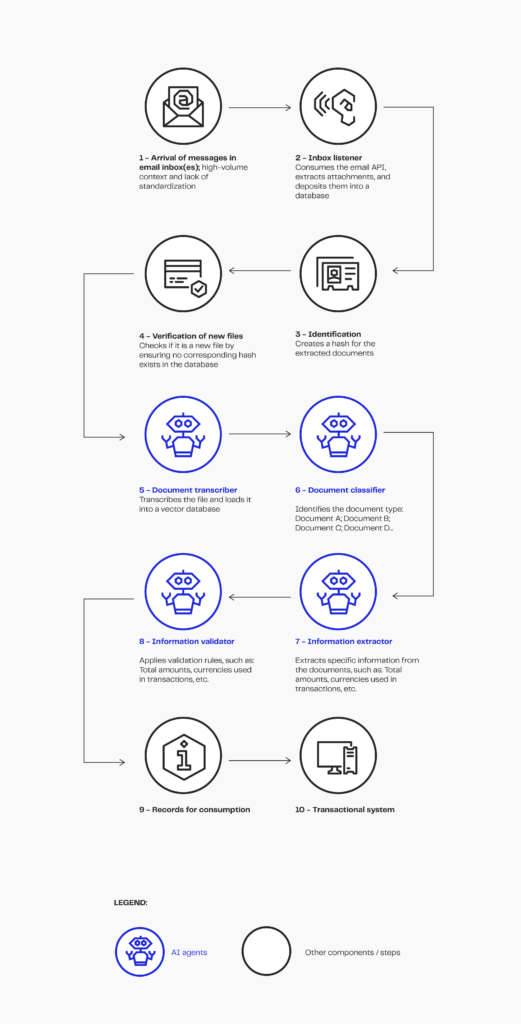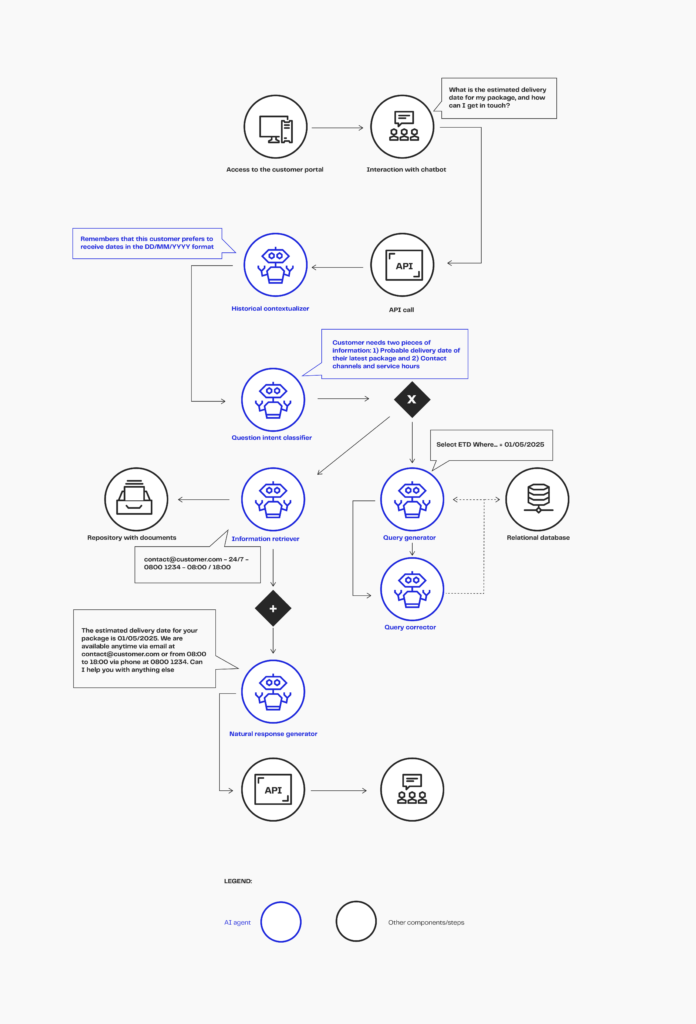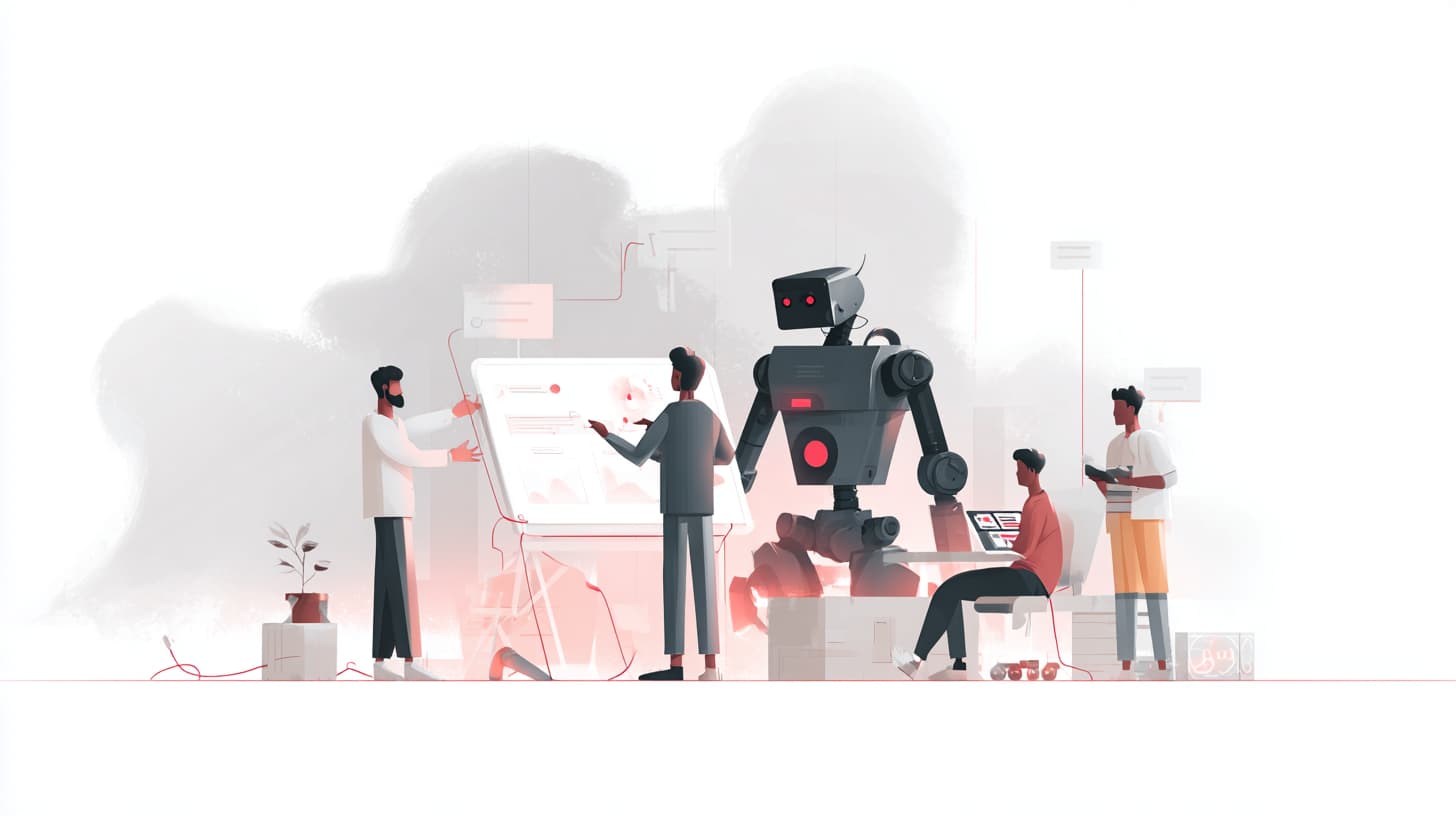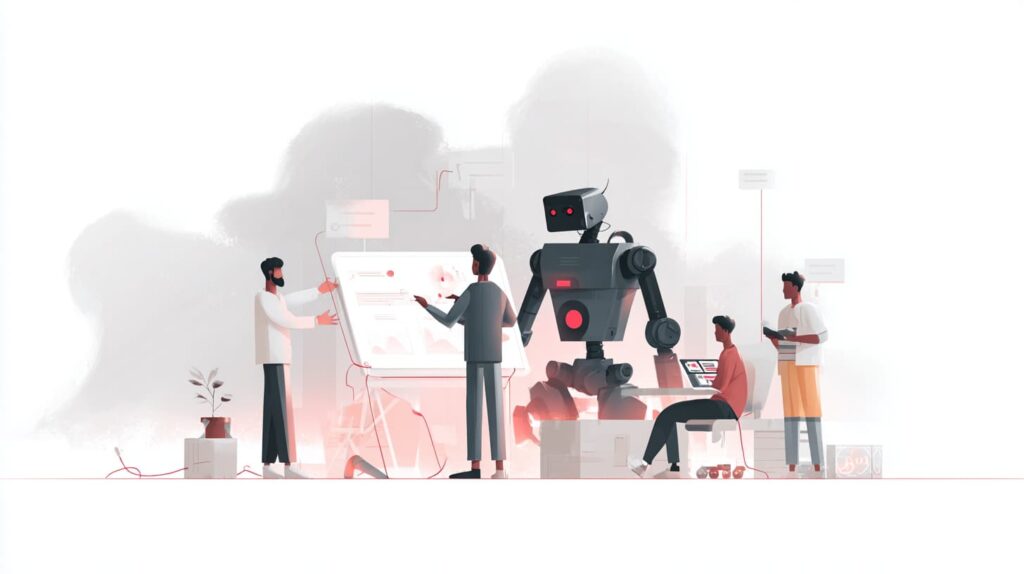By Marcio Pupin, Pedro Escobar e Marcus Couto
- Artificial Intelligence Agents are systems capable of executing complex task workflows and functioning as autonomous “colleagues” within organizations, with little to no human supervision.
- This exponential evolution is partly enabled by the abundance of generated data and the growing computational power available at more affordable costs.
- This article explores the context in which these agents are beginning to be applied in business, featuring two EloGroup case studies.
Society and industries are still absorbing the impact of Foundation Models, particularly Large Language Models (LLMs), on their respective domains. Foundation Models, as the name suggests, serve as the foundation for a technology revolutionizing the world: Generative Artificial Intelligence (Gen AI). At the core of its applications lies a vast range of possibilities to boost productivity while simultaneously improving operational quality. Although Gen AI was only publicly introduced in November 2022, the World Economic Forum estimates annual gains of $4.4 trillion across multiple industries, with productivity increases of up to 40%. Microsoft, a key player in the Gen AI sector, projects a 44% productivity increase, with 21% of tasks improved by the technology and 23% fully automated without compromising delivery quality.
This exponential evolution is driven by several factors: the abundance of data being generated, increasing computational power at more affordable costs, and Gen AI’s inherent ability to create content and handle more complex contextual scenarios. With the surge in demand for applications across various sectors, we are witnessing a revolution within a revolution—one marked by the emergence of Artificial Intelligence Agents. These agents are capable of executing complex task workflows and functioning as autonomous “colleagues” within organizations, requiring little to no human supervision.
What Are Artificial Intelligence Agents?
- Proactiveness: AI Agents initiate tasks without requiring a specific trigger event.
- Autonomous Problem-Solving: Using instructions programmed by their creators, AI Agents can independently analyze challenges, set objectives, and execute actions. They perform entire workflows rather than simply returning information in data formats, such as text.
- Adaptive Learning: AI Agents utilize long prompt contexts and continuous reinforcement learning, enabling them to adjust goals and strategies as conditions change. This flexibility allows them to handle rules and instructions less rigidly.
- Multimodal Capabilities: Leveraging Foundation Models, AI Agents work with various input and output formats, including text, images, sound, and video.
To illustrate the difference between an AI Agent and a Robotic Process Automation (RPA) system, commonly used for automation, consider this hypothetical example:
- In a traditional RPA workflow, a user might automate a process with instructions like, “When I receive emails with attached PDF documents containing the text ‘financial report,’ forward the email to a specific recipient.”
- In contrast, an AI Agent can be built as an assistant that securely collects and analyzes financial data from various company sources. Based on this analysis, it can proactively suggest insights or automatically adjust the prices of products or services, optimizing one or more metrics, such as profit margins or elasticity, within predefined limits. As AI Agents leverage continuous and adaptive learning, they can consistently refine their recommendations with little to no human interaction.
Across various industries, organizations view AI Agents as a tool with immense potential to boost productivity, minimize errors, enhance process security, and more. This growing interest reflects a global trend of seeking not only operational optimization but also opportunities to generate value and stand out in an increasingly competitive market. According to Gartner, by 2028, at least 15% of daily work decisions will be autonomously made by AI Agents.
However, implementing this autonomous “workforce” presents significant organizational challenges, which will be discussed later. In 2024, Google reported that at least 25% of its newly generated code was produced by AI. Similarly, Meta, through its CEO Mark Zuckerberg, announced plans to implement AI at a full-seniority level in software engineering. Jensen Huang, CEO of NVIDIA, encapsulated the transformative potential of this shift: “Every company’s IT department will become the HR department for AI Agents in the future.”
Scalability in the use of AI Agents
The multifaceted nature of AI Agents introduces a range of complexities that need to be addressed and evolved, particularly in the context of their implementation within organizations. Regarding the scope of AI Agents at different levels of organizational complexity, we observe:
Individual Agents
Designed to operate in highly specific contexts, individual agents work with restricted access and defined datasets. Their complexity lies in their lack of generic adaptability; they cannot learn or adjust to new environments outside their initial scope.
Evolving these agents requires the development of advanced learning algorithms that enable dynamic adaptation to different contexts without extensive reprogramming.
This is the most common model for experimenting with AI Agents in solving business problems. Typically, these agents are programmed to act as specialists in a specific context, but they cannot be applied to other contexts without reprogramming.
Agents Shared Among Users
The creation of agents that can be utilized by different users in varied contexts presents significant challenges. Ensuring that the agent maintains consistency and relevance in its results despite differences in input data, access levels, and the inherent complexities of diverse contexts is crucial.
Additionally, the need to personalize the agent to meet individual user requirements without compromising data security and privacy adds another layer of complexity.
The evolution of these agents requires the development of sophisticated mechanisms for context management and transferable learning, enabling them to adapt dynamically to different user needs and operational scenarios while maintaining their effectiveness and reliability.
Corporately Scalable Agents
Implementing agents that operate on a large scale within an organization involves even deeper complexities. These agents must adapt to multiple environments, integrate with various databases, and manage different access levels and operational scenarios.
Scalability presents challenges such as the efficient orchestration of computational resources, maintaining data integrity and consistency in real-time, and ensuring compliance with regulations and internal policies.
Evolving these agents requires innovative solutions in system architecture, cybersecurity, and data governance.
The progression in the evolution of AI Agents across different levels of scalability demands not only technological advancements but also an interdisciplinary approach that considers ethical, legal, and business aspects.
A deep understanding of these complexities is essential for the effective and responsible implementation of AI Agents within organizations, ensuring they can meet the dynamic needs of the contemporary corporate environment.
Possible Use Cases of AI Agents in Industry
Below, we list some possible use cases of AI Agents in the industry:
Predictive Maintenance in Factories
They can monitor machine sensors to predict failures in advance, reducing maintenance costs and optimizing operational uptime.
Logistics Route Optimization
They analyze real-time data, such as traffic, weather conditions, and delivery schedules, to calculate the most efficient routes for transporting goods.
Automated Inventory Management
They monitor material consumption and automatically adjust replenishment orders, preventing overstocking or stock shortages.
Automated Quality Control
They analyze products on production lines using computer vision to identify defects or variations outside the standard.
Virtual Assistants for Technical Support
They function as chatbots to assist operational teams, helping to resolve technical issues with machines or systems.
Case Study: Automating Document Processing
The focus of the case study is on automating the processing, classification, and extraction of information from documents received via email at a company operating in Brazil and abroad.
Challenge
Traditionally, without the implementation of an automated workflow, the processing of such documents is slow and manual or, in rare cases, based on rigid rules that do not account for context, as mentioned earlier.
Majoritariamente, os funcionários precisam abrir cada e-mail, baixar os anexos, identificar o tipo de documento e, em seguida, extrair manualmente os dados relevantes.
Invariavelmente, um processo manual tende a gerar erros e gargalos no fluxo de trabalho. Ao mesmo tempo, a aplicação de uma automação tradicional com RPA também pode ser insuficiente, dada a necessidade de o fluxo interagir com dados semiestruturados ou desestruturados que exigem uma maior flexibilidade por parte do sistema. Entram aí os Agentes de IA.
Solution
Using a combination of specialized AI Agents and a workflow management system, the entire process can be automated. The system operates through a series of agents working together:

Benefits
Increased Efficiency: The automated process significantly reduces the time required to process documents, freeing employees for higher-value tasks.
Improved Accuracy: Automating data extraction and validation minimizes human errors, resulting in more reliable information.
Cost Reduction: The system lowers labor costs associated with manual document processing. Each document processed end-to-end costs $0.11 using the OpenAI GPT-4 model, a cost that can be further reduced with cheaper models.
Scalability: The system can easily handle increasing document volumes without the need for a proportional increase in staff.
Case Study 2: AI Chatbot for Advanced Customer Support
In this case study, we will explore the implementation of an AI chatbot for a logistics operator specializing in national and international movements. The goal of this chatbot is to provide instant, accurate, and personalized responses to customer inquiries.
Challenge
Traditional customer support channels, such as phone calls and emails handled by human operators, can be slow and inefficient. Customers often face long wait times and may receive inconsistent information depending on the representative they interact with.
Solution
AI Agents integrate a relational database and a document repository to provide data, enabling an intelligent chatbot to understand customer requests, extract relevant information from multiple data sources, and deliver comprehensive and personalized responses:

Benefits
Improved Customer Experience: Customers receive instant and personalized responses to their inquiries, enhancing their overall experience. Additionally, personalization can be tailored to consider tone, level of formality, specific preferences (such as language, date formats like dd/mm/yyyy, specific currency formats, etc.) without compromising the consistency of the returned information.
Increased Efficiency: The chatbot handles a high volume of customer inquiries simultaneously, reducing the workload of human representatives and allowing them to focus on more complex issues.
Greater Accuracy: By integrating with databases and document repositories, the chatbot provides precise and consistent information aligned with existing records.
Cost Reduction: Automating customer support through the chatbot can result in significant cost savings compared to traditional methods. In this case, each message answered by the system costs $0.027.
24/7 Availability: The chatbot can provide support around the clock, ensuring customers receive assistance whenever they need it.
The Importance of AI Agent Security
As demonstrated in the two previous case studies, AI Agents operate in direct contact with organizational databases, many of which contain confidential or sensitive information, making them potential targets for criminal infiltration, cyberattacks, and data breaches. Ensuring the protection of these data and automated operational workflows is a strategic priority for companies adopting this technology.
One of the main challenges lies in safeguarding against unauthorized access and information leaks. AI Agents often function in interconnected environments, accessing multiple databases and systems, which increases the attack surface. Implementing strict access controls, such as multi-factor authentication and encryption, is essential to ensure that only authorized users or systems can interact with the agents.
Additionally, it is critical to mitigate risks related to the integrity and reliability of the agents. Since they are designed to make autonomous decisions, any malicious manipulation of their algorithms or model training could result in harmful actions. Strategies such as regular audits, real-time monitoring, and robust learning models help prevent manipulation or anomalous behavior in these systems.
A promising approach currently being tested to advance application security and controls is the use of independent AI Agents to perform the first level of validation on other agents.
Conclusion: A Milestone in the Evolution of Automation and Digital Transformation
AI Agents represent a milestone in the evolution of process automation and business transformation. By enabling autonomous systems to perform complex and analytical tasks, these tools have the potential to make operations cheaper, more efficient, accurate, and secure, empowering human employees to generate even greater value in their activities.
The transformative power of AI Agents, however, requires a careful and responsible approach. Successful implementation goes beyond the technology itself, demanding a holistic vision that encompasses security and governance. Companies looking to adopt AI Agents must be prepared to tackle integration challenges, manage security and privacy risks, and align their operations with the growing ethical expectations of contemporary society.
We stand on the threshold of a new era, where AI Agents not only optimize businesses but also influence how we work, make decisions, and interact with technology. Ultimately, AI Agents offer an unprecedented opportunity to innovate and differentiate in an ever-changing market. Those who master the complexities of this technology will be better positioned to lead the next industrial revolution and shape the future of organizations in a sustainable and responsible way.
Want to understand how EloGroup can help your business unlock the full potential of Artificial Intelligence Agents?
MARCIO PUPIN is partner at EloGroup
PEDRO ESCOBAR is manager at EloGroup
MARCUS COUTO is insights Editor at EloGroup











